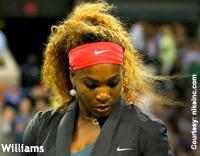
Brands are back in fashion. Their importance to consumers has increased 10-fold since 1996. Nike, Burberry and J. Crew are on the rise, and Ralph Lauren and Banana Republic are losing
ground.
When Brand Keys -- the New York-based brand and engagement research consultancy -- conducted its first research into fashion, only 3% of U.S. apparel buyers felt that
fashion brands and their associated logos were important to consumers in differentiating their wardrobes. That number rose to a whopping 30% in this year’s survey.
Passionate
sports fans still like to wear their hearts on their sleeves.
This year’s top five winners in the Brand Keys Fashion Index are: one’s Favorite Sports Team (Mets, Jets,
Nets, etc.), Armani, Nike, Ralph Lauren/Polo and Burberry.
advertisement
advertisement
“What we’re seeing is a greater mix of luxury and leisure this year,” Robert Passikoff, president of
Brand Keys, Inc., tells Marketing Daily. Among women, couture brands continue to rank high, with Chanel in the lead position. Casual brands are growing in importance to men.
"While
it's true that consumers are cautious about spending, that very reality is what drives them into the arms of true brands," Passikoff adds. “The more considered a purchase, the greater the role a
strong brand plays in the decision-making process, especially in the very personal category of fashion, where the brand is the source of emotional engagement.”
The surprising
news, Passikoff says, was the sharp decline of the Ralph Lauren brand among women this year. “Lauren has always been the gold standard. He’s way up there with the sports tier, but this is
the first year he hasn’t been first or second.”
“Lauren is an icon, but being iconic also has the negative side of it. People take you for granted,” he
adds.
Nike, meanwhile, has always performed well in the Fashion Index, but moved up five points this year.
“They’ve been doing a lot more
promotion,” says Passikoff, adding that the appearance of the brand’s apparel on sports figures at the U.S. Open and teams has “absolutely incomparable” value.
Fashion brands like Armani, Burberry, and YSL all moved up from an already respectable showing in the top 15, along with leisure brands like Nike (#3), J. Crew (#6) and Levis (#10). Uniqlo,
which made the list for the first time in 2012, is in 14th place among male fashion buyers this year.
“In the context of fashion, value isn’t just what consumers’
dollars buy, it’s how fashion fits consumers’ lifestyle, self-perception, and expectations. This is especially true in a retail marketplace overflowing in excess of similar products,
congruous distribution and bargain basement pricing,” Passikoff adds.
A total audience of 7,500 men and women, ages 21 to 65, are surveyed, and the top 15 fashion brands
are ranked based on how many cite the brand as important to them on an unaided basis. (In the charts below, dashes mean no change and NA means the brand did not appear on last year’s list.)
Men’s Fashion 15
1. Favorite Sports Team 40% (-3)
2. Nike 39% (+1)
3. Armani 38% (+6)
4. Ralph Lauren/Polo 35% (+6)
5. Hilfiger 32% (+2)
6. J.
Crew 30% (+11)
7. Levi’s 28% (+9)
8. Calvin Klein 27% (-2)
9. Brooks Brothers 26% (+3)
10. Burberry 25% (+7)
11. Banana Republic 22% (-1)
12. Lacoste 20%
(-1)
13. Tom Ford 16% (-2)
14. Uniqlo 15% (+2)
15. Hugo Boss 10% (-2)
Women’s Fashion 15
1. Chanel 41% (+5)
2. Armani 40% (+5)
3. Favorite
Sports Team/Coach 38% (-1, NA)
4. YSL 37% (+7)
5. Burberry 35% (+12)
6. Ralph Lauren/Polo 33% (-8)
7. Dior 32% (+1)
8. Nike 31% (NA)
9. Victoria’s Secret/GAP
30% (+11, NA)
10. Kate Spade/Tory Burch 29% (+11,+11)
11. J. Crew/Calvin Klein 28% (-1, +5)
12. Banana Republic/Dona Karan (+3, -1)
13. Tom Ford/Stella McCartney (+6, NA)
14. Marc Jacobs 20% (+4)
15. La Perla/Guess/Levi’s/H&M 15% (+5, -4, -7, NA)